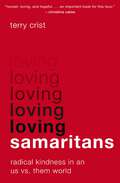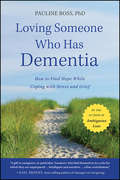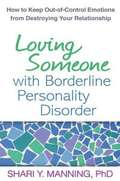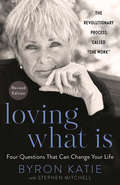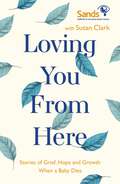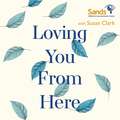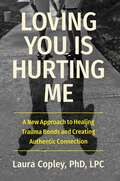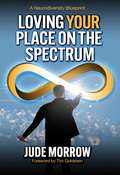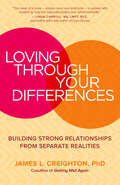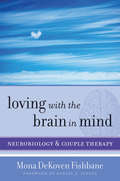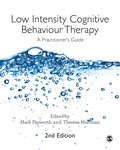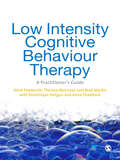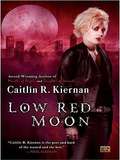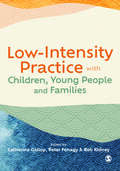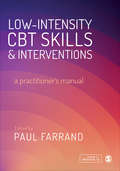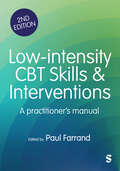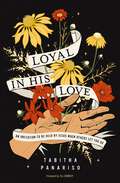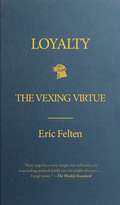- Table View
- List View
Loving Pedagogy in Second and Foreign Language Education: Underlying Components, Measurement, and Ecological Systems (Second Language Learning and Teaching)
by Ali DerakhshanThis book provides a vivid and comprehensive picture of loving pedagogy in second language (L2) education. It focuses on the theoretical and empirical foundations of loving pedagogy to set the ground for researching its ecological systems and measurement. Foreword, written by Elisabeth Vanderheiden, introduces pedagogical love as a transformative approach in education during times of global crises and neoliberal shifts. It frames pedagogical love not merely as relational warmth but as an ethical stance and political project that challenges technocratic educational paradigms. The first chapter outlines the background, significance, purpose, and critical rationale for an empirical study to which the whole book is dedicated. The second chapter deals with the theoretical underpinnings of this study, especially affective pedagogy, positive psychology, existential positive psychology, rhetorical/relational goal theory, broaden-and-build theory, PERMA model, and attachment theory, followed by a comprehensive review of related empirical studies. The third chapter presents the design and methodology of the study, while chapter four presents and discusses quantitative and qualitative outcomes. Chapter five explains the conclusions drawn from the results and presents pedagogical implications and directions for future research in the field of SLA. Afterword, written by Satu Uusiautti, considers loving pedagogy the foundation of positive education in the future. This book is intended for scholars and researchers in the field of second language acquisition and pedagogy, and more generally, those in applied linguistics and positive psychology.
Loving Psychoanalysis: Looking at Culture with Freud and Lacan
by Ruth GolanPsychoanalysis was neither a product of philosophy nor of academic study. Rather, psychoanalysis was born in the clinic. Freud took his lead from hysterical women; the accounts of their pain, anxieties and physical symptoms led him to formulate his theories on the existence of the unconscious.
Loving Samaritans: Radical Kindness in an Us vs. Them World
by Terry CristYou can live a radically inclusive life without compromising your beliefs or the truth of the gospel.Humanity is more divided now than ever, gridlocked over social issues, race, gender, climate change, immigration, and our responsibility to vulnerable people. How did we get here? And what can we do to build bridges where walls exist?As a pastor committed to building deep relationships with people whose life experiences are different than his own, Terry Crist knows the beauty and challenge of connecting across dividing lines of race, economic status, faith, and much more. And in this book, he shares how you can too.Profoundly weaving the story of Jesus and the Samaritan woman at the well with his own stories and examples from culture today, Terry addresses how we've strayed from the unity God intended and how we can trade judgment for grace, disputes for harmony, apathy for empathy, and hate for love and acceptance. By the end of this book, you will be able to:Identify how you personally see the world and why it mattersRecognize those on the margins who are right around youImitate Jesus's love for all humanity in the interactions you have with othersExtend dignity to those suffering from mental illness, homelessness, and addictionMaintain thriving relationships when family members are on opposing sides of issuesBe an ambassador of reconciliation in your community It doesn't have to be one or the other--you can both love God and love your neighbor.
Loving Someone Who Has Dementia: How to Find Hope while Coping with Stress and Grief
by Pauline BossResearch-based advice for people who care for someone with dementia Nearly half of U.S. citizens over the age of 85 are suffering from some kind of dementia and require care. Loving Someone Who Has Dementia is a new kind of caregiving book. It's not about the usual techniques, but about how to manage on-going stress and grief. The book is for caregivers, family members, friends, neighbors as well as educators and professionals—anyone touched by the epidemic of dementia. Dr. Boss helps caregivers find hope in "ambiguous loss"—having a loved one both here and not here, physically present but psychologically absent. Outlines seven guidelines to stay resilient while caring for someone who has dementia Discusses the meaning of relationships with individuals who are cognitively impaired and no longer as they used to be Offers approaches to understand and cope with the emotional strain of care-giving Boss's book builds on research and clinical experience, yet the material is presented as a conversation. She shows you a way to embrace rather than resist the ambiguity in your relationship with someone who has dementia.
Loving Someone with Borderline Personality Disorder
by Shari ManningPeople with borderline personality disorder (BPD) can be intensely caring, warm, smart, and funny but their behavior often drives away those closest to them. If you're struggling in a tumultuous relationship with someone with BPD, this is the book for you. Dr. Shari Manning helps you understand why your spouse, family member, or friend has such out-of-control emotions and how to change the way you can respond. Learn to use simple yet powerful strategies that can defuse crises, establish better boundaries, and radically transform your relationship. Empathic, hopeful, and science based, this is the first book for family and friends grounded in dialectical behavior therapy (DBT), the most effective treatment for BPD.
Loving Someone with Borderline Personality Disorder: How to Keep Out-of-Control Emotions from Destroying Your Relationship
by Marsha M. Linehan Shari Y. ManningPeople with borderline personality disorder (BPD) can be intensely caring, warm, smart, and funny-but their behavior often drives away those closest to them. If you're struggling in a tumultuous relationship with someone with BPD, this is the book for you. Dr. Shari Manning helps you understand why your spouse, family member, or friend has such out-of-control emotions-and how to change the way you can respond. Learn to use simple yet powerful strategies that can defuse crises, establish better boundaries, and radically transform your relationship. Empathic, hopeful, and science based, this is the first book for family and friends grounded in dialectical behavior therapy (DBT), the most effective treatment for BPD.
Loving What Is, Revised Edition: Four Questions That Can Change Your Life
by Stephen Mitchell Byron KatieDiscover the truth hiding behind troubling thoughts with Byron Katie&’s self-help classic.In 2003, Byron Katie first introduced the world to The Work with the publication of Loving What Is. Nearly twenty years later, Loving What Is continues to inspire people all over the world to do The Work; to listen to the answers they find inside themselves;and to open their minds to profound, spacious, and life-transforming insights. The Work is simply four questions that, when applied to a specific problem, enable you to see what is troubling you in an entirely different light.Loving What Is shows you step by step, through clear and vivid examples, exactly how to use this revolutionary process for yourself. In this revised edition, readers will enjoy seven new dialogues, or real examples of Katie doing The Work with people to discover the root cause of their suffering. You will observe people work their way through a broad range of human problems, learning freedom through the very thoughts that had caused their suffering—thoughts such as &“my husband betrayed me&” or &“my mother doesn&’t love me enough.&”If you continue to do The Work, you may discover that the questioning flows into every aspect of your life, effortlessly undoing the stressful thoughts that keep you from experiencing peace. Loving What Is offers everything you need to learn and live this remarkable process, and to find happiness as what Katie calls &“a lover of reality.&”
Loving You From Here: Stories of Grief, Hope and Growth When a Baby Dies
by Susan ClarkFew experiences can compare to the trauma and pain of losing a baby; and the wall of silence that often surrounds that loss can make grieving even harder. Loving You From Here explores the traumatic impact of losing a baby through stillbirth and neonatal death. It features the moving stories of multiple families; some affected recently, some decades ago, but still living with the loss. This book is a practical guide for grieving parents in the grips of tragedy, and those around them who want to be able to offer support. From managing those initial feelings of shock, grief, guilt and anger, this book will also show families how it is possible to grow around that grief and eventually form an enduring bond with their baby.This profound and insightful book will help everyone impacted by the loss of a baby - before, during or after birth - including those who have suffered an early or a late miscarriage and those who have had an ectopic pregnancy, and provides sensitive and reassuring advice on all aspects of loss and bereavement, as well as practical advice on how to find a new normal.This groundbreaking book breaks through the suffocating silence that surrounds the death of a baby and gives a voice to all those affected by baby loss.
Loving You From Here: Stories of Grief, Hope and Growth When a Baby Dies
by Susan ClarkFew experiences can compare to the trauma and pain of losing a baby; and the wall of silence that often surrounds that loss can make grieving even harder.Loving You From Here explores the traumatic impact of losing a baby through stillbirth and neonatal death. It features the moving stories of multiple families; some affected recently, some decades ago, but still living with the loss. This book is a practical guide for grieving parents in the grips of tragedy, and those around them who want to be able to offer support. From managing those initial feelings of shock, grief, guilt and anger, this book will also show families how it is possible to grow around that grief and eventually form an enduring bond with their baby.This profound and insightful book will help everyone impacted by the loss of a baby - before, during or after birth - including those who have suffered an early or a late miscarriage and those who have had an ectopic pregnancy, and provides sensitive and reassuring advice on all aspects of loss and bereavement, as well as practical advice on how to find a new normal.This groundbreaking book breaks through the suffocating silence that surrounds the death of a baby and gives a voice to all those affected by baby loss.(P) 2020 Hodder & Stoughton Ltd
Loving You Is Hurting Me: A New Approach to Healing Trauma Bonds and Creating Authentic Connection
by Laura CopleyMove forward in your journey and learn how to heal your emotional wounds, get unstuck, and get into healthy, loving, intimate relationships with the help of this eye-opening book. At the core of most toxic relationships is a painful trauma wound desperate to be healed. As a licensed professional counselor and trauma researcher, Dr. Laura Copley often found herself disturbed by the stigma that her profession puts on trauma survivors who are in these toxic bonds, often too quickly labeling them as victims or abusers and blaming them for their troubled relationships. But trauma survivors try to navigate romantic relationships in the only way they know how--fearfully and painfully. Too often, survivors of trauma are left feeling hopeless, exiled from normal social interactions, and destined for heartbreak in any relationship they attract. Through her work with clients, and her own experiences, Dr. Copley developed a roadmap for healing the toxic emotions that come from being bonded by trauma in relationships. In Loving You is Hurting Me, Dr. Copley guides you through your trauma origins and into a life rich with meaning, loving connection, and inspiration. Drawing from groundbreaking science on trauma and its effects on the body, and from her own practice including a decade&’s worth of research on trauma and intimacy, Dr. Copley presents an experiential and transformative approach unlike any other. Her program transforms your trauma bond into deep connection with the self and safe intimacy with others.
Loving Your Place on the Spectrum: A Neurodiversity Blueprint
by Jude MorrowLoving Your Place on the Spectrum: A Neurodiversity Blueprint provides answers to many of your questions about autism, helping you to embrace neurodiversity and love your autistic self and the autistic people in your life. Jude Morrow speaks from personal experience when he says that he has learned to be proud to be autistic and he wants you to be proud too.Browse through the many books available on autism and you might notice a trend: too many of them are written by neurotypical professionals who aim to &“fix&” autism or help autistic people appear &“normal.&” Jude Morrow noticed this problem and decided that something needed to change. Loving Your Place on the Spectrum is a guide for living a happy and successful autistic life. Jude combines his own experiences as an autistic man with the stories of others to provide a handbook to help autistic individuals navigate life&’s major changes, from childhood to college, jobs, and relationships. Each chapter identifies common issues faced by autistic people of a particular age or social group and explains how educators, teachers, parents, and professionals can be supportive through all these life stages. The world needs a new perspective on autism, and Jude Morrow&’s Loving Your Place on the Spectrum provides parents, workplaces, individuals, and society an alternative, strengths-based viewpoint, where autistic people are accepted, embraced, and loved.
Loving through Your Differences: Building Strong Relationships from Separate Realities
by James L. CreightonFIND HAPPINESS AND FULFILLMENT THROUGH — RATHER THAN DESPITE — YOUR DIFFERENCES Dr. James Creighton has worked with couples for decades, facilitating communication and conflict resolution and teaching them the tools to build healthy, happy relationships. He has found that many couples start out believing they like the same things, see people the same way, and share a united take on the world. But inevitably differences crop up, and it can be profoundly discouraging to find that one’s partner sees a person, situation, or decision completely differently. Although many relationships flounder at this point, Creighton shows that this can actually be an opportunity to forge stronger ties. In Loving through Your Differences, he draws on the latest research in cognitive science and developmental psychology to show how we invent our realities with our perceptual minds. He then provides clear, concrete tools for shifting our perceptions and reframing our responses. The result moves couples out of the fear and alienation of “your way or my way” and into a deep understanding of the other that allows for an “our way.” As Creighton shows, this way of being together, based on the reality of individuality rather than the illusion of sameness, sets the stage for long-term excitement, discovery, and fulfillment.
Loving with the Brain in Mind: Neurobiology and Couple Therapy (Norton Series on Interpersonal Neurobiology)
by Daniel J. Siegel Mona Dekoven FishbaneFacilitating change in couple therapy by understanding how the brain works to maintain--and break--old habits. Human brains and behavior are shaped by genetic predispositions and early experience. But we are not doomed by our genes or our past. Neuroscientific discoveries of the last decade have provided an optimistic and revolutionary view of adult brain function: People can change. This revelation about neuroplasticity offers hope to therapists and to couples seeking to improve their relationship. Loving With the Brain in Mind explores ways to help couples become proactive in revitalizing their relationship. It offers an in-depth understanding of the heartbreaking dynamics in unhappy couples and the healthy dynamics of couples who are flourishing. Sharing her extensive clinical experience and an integrative perspective informed by neuroscience and relationship science, Mona Fishbane gives us insight into the neurobiology underlying couples' dances of reactivity. Readers will learn how partners become reactive and emotionally dysregulated with each other, and what is going on in their brains when they do. Clear and compelling discussions are included of the neurobiology of empathy and how empathy and selfregulation can be learned. Understanding neurobiology, explains Fishbane, can transform your clinical practice with couples and help you hone effective therapeutic interventions. This book aims to empower therapists-- and the couples they treat--as they work to change interpersonal dynamics that drive them apart. Understanding how the brain works can inform the therapist's theory of relationships, development, and change. And therapists can offer clients "neuroeducation" about their own reactivity and relationship distress and their potential for personal and relational growth. A gifted clinician and a particularly talented neuroscience writer, Dr. Fishbane presents complex material in an understandable and engaging manner. By anchoring her work in clinical cases, she never loses sight of the people behind the science.
Low Intensity Cognitive Behaviour Therapy: A Practitioner's Guide
by Theresa Marrinan Dr Mark PapworthThis is the essential book for any health professionals whose role incorporates low intensity CBT. It introduces readers to the principles and skills of cognitive behaviour therapy, and guides them through the entire process of working with adult patients with common mental health problems. Beginning at the initial assessment, it takes students through the implementation of interventions to the management of ending. Detailed case studies illustrate each step of patients' recovery journeys. This new edition: is updated in line with changes in the PWP curriculum and broader IAPT policies includes new chapters on working with older adults and patients with long-term conditions adds new exercises to help readers reflect on their own practice, and builds confidence to help them become outstanding practitioners.
Low Intensity Cognitive Behaviour Therapy: A Practitioner's Guide
by Theresa Marrinan Dr Mark PapworthThis is the essential book for any health professionals whose role incorporates low intensity CBT. It introduces readers to the principles and skills of cognitive behaviour therapy, and guides them through the entire process of working with adult patients with common mental health problems. Beginning at the initial assessment, it takes students through the implementation of interventions to the management of ending. Detailed case studies illustrate each step of patients' recovery journeys. This new edition: is updated in line with changes in the PWP curriculum and broader IAPT policies includes new chapters on working with older adults and patients with long-term conditions adds new exercises to help readers reflect on their own practice, and builds confidence to help them become outstanding practitioners.
Low Intensity Cognitive-Behaviour Therapy: A Practitioner's Guide
by Brad Martin Anna Chaddock Dominique Keegan Theresa Marrinan Dr Mark Papworth'An engaging textbook which explores 'low intensity interventions' and modes of delivery whilst placing equal emphasis on the therapeutic value of the relationship between service user and practitioner' - Jane Briddon, APIMH Primary Mental Health Care MSC, University of Manchester This is a practical and jargon-free introduction to the principles, skills and application of Low Intensity Cognitive Behaviour Therapy (LICBT). Tailored specifically for the low intensity practitioner, it shows you how to deliver the approach to service users presenting with common adult mental health problems such as anxiety or depression, and how to use therapy 'vehicles' like supported self-help. Beginning at the initial assessment, the book will guide you all the way through the implementation of interventions to the management of endings - with key case examples threading through the book to illustrate each step. Interactive exercises will encourage your self-development, leaving you with a deeper understanding of the approach. This accessible, evidence-based book is essential reading for Psychological Wellbeing Practitioners (PWPs). It will also be useful for health professionals of all kinds who need a practical guide to applying this cost-effective therapy in clinical settings. Mark Papworth is consultant clinical psychologist at Newcastle University. Theresa Marrinan is clinical/academic tutor at Newcastle University. Brad Martin is a consultant clinical psychologist and cognitive therapist in Wellington, New Zealand. Dominique Keegan is a clinical psychologist and cognitive therapist, working in the NHS and as a clinical lecturer on the PGDipCBT at Newcastle University. Anna Chaddock is a clinical psychologist and CBT therapist in Newcastle upon Tyne Hospitals NHS Foundation Trust.
Low Red Moon
by Caitlin R. KiernanSeveral years after the events in Threshold, Chance and Deacon have married. They're looking ahead to the future, trying to put the past behind them. But new nightmares await them as a woman with a need for violence enters their lives. And something even worse has followed her...
Low-Intensity Practice with Children, Young People and Families
by Peter Fonagy Catherine Gallop Rob KidneyThis is the essential "how to guide" for low-intensity mental health trainees, practitioners and service supervisors who support children and young people with mild-moderate anxiety, depression and behavioural difficulties. It provides a manual for practice covering assessment, decision-making and key interventions, with step-by-step guidance, case vignettes and accompanying worksheets to support each evidence-based intervention. It also offers guidance on key service implementation principles, supervision and adaptations to practice. It is an ideal resource for those in low-intensity training, practitioner or leadership roles, looking to develop competency in the low-intensity cognitive behavioural clinical method.
Low-Intensity Practice with Children, Young People and Families
by Peter Fonagy Catherine Gallop Rob KidneyThis is the essential "how to guide" for low-intensity mental health trainees, practitioners and service supervisors who support children and young people with mild-moderate anxiety, depression and behavioural difficulties. It provides a manual for practice covering assessment, decision-making and key interventions, with step-by-step guidance, case vignettes and accompanying worksheets to support each evidence-based intervention. It also offers guidance on key service implementation principles, supervision and adaptations to practice. It is an ideal resource for those in low-intensity training, practitioner or leadership roles, looking to develop competency in the low-intensity cognitive behavioural clinical method.
Low-intensity CBT Skills and Interventions: a practitioner′s manual
by Paul FarrandThis book takes you step-by-step through the Low-intensity CBT interventions and clinical procedures. With an Online Resource site of accompanying workbooks and worksheets, it provides a comprehensive manual for trainee and qualified Psychological Wellbeing Practitioners.
Low-intensity CBT Skills and Interventions: a practitioner′s manual
by Paul FarrandThis book takes you step-by-step through the Low-intensity CBT interventions and clinical procedures. With an Online Resource site of accompanying workbooks and worksheets, it provides a comprehensive manual for trainee and qualified Psychological Wellbeing Practitioners.
Low-intensity CBT Skills and Interventions: a practitioner′s manual
by Paul FarrandThis book takes you step-by-step through the Low-intensity CBT interventions, competencies and clinical procedures. It provides a comprehensive manual for trainee and qualified Psychological Wellbeing Practitioners within NHS Talking Therapies anxiety and depression services or for other roles that support Low-intensity CBT. New to this edition: Updated research and references Updated further reading and resources New chapters covering the different modalities available for remote LI-CBT and their benefits and drawbacks: telephone, email, and video New chapter on CBT Self-help in Groups New chapter on Working with People from Ethnic Minority Backgrounds New chapter on Working with Long-term Health Conditions Updated chapter on Patient Assessment Updated chapter on Clinical Decision-Making Revised chapter on Using Behaviour Change Models Updated to reflect changes in the new LI-CBT National Curriculum
Low-intensity CBT Skills and Interventions: a practitioner′s manual
by Paul FarrandThis book takes you step-by-step through the Low-intensity CBT interventions, competencies and clinical procedures. It provides a comprehensive manual for trainee and qualified Psychological Wellbeing Practitioners within NHS Talking Therapies anxiety and depression services or for other roles that support Low-intensity CBT. New to this edition: Updated research and references Updated further reading and resources New chapters covering the different modalities available for remote LI-CBT and their benefits and drawbacks: telephone, email, and video New chapter on CBT Self-help in Groups New chapter on Working with People from Ethnic Minority Backgrounds New chapter on Working with Long-term Health Conditions Updated chapter on Patient Assessment Updated chapter on Clinical Decision-Making Revised chapter on Using Behaviour Change Models Updated to reflect changes in the new LI-CBT National Curriculum
Loyal in His Love: An Invitation to Be Held by Jesus When Others Let You Go
by Tabitha PanarisoWhen everyone else leaves, Jesus stays. When all fails, Jesus remains.Rejection is inevitable. Yet we spend little time considering the significant impact it makes on an individual's whole self. When we do, we swaddle it in quippy statements and shallow encouragement--meaningful for just a moment. But rejection--like abandonment, betrayal, and estrangement--leaves aching wounds that challenge and forge our most intimate thoughts of who we believe God, others, and ourselves to be.In Loyal in His Love, Tabitha Panariso blends biblical truth, candid personal stories, and timeless wisdom forged through personal experience and her vocation as a therapist to invite readers into a new way of living. The heart that suffers rejection can't be cured. It must be resuscitated. Its condition warrants more than just platitudes--it merits the full attention of a loyal and loving God.This isn't just another Christian self-help book. Though Tabitha makes ample room for the hurting to process their own stories, points them to God's faithfulness, and challenges the way they think--she doesn't stop there. Jesus lived a life and death marked by rejection. Yet we remember Him for His compassion and generosity. He was and is proof that we could be remembered that way too. Thus, Tabitha guides readers through the life and death of Jesus as a means of counter-cultural response to the pain of rejection.Loyal in His Love ends squarely on the triumph of Christ's resurrection--not just as an antidote but a daily supplement. His restoration is ours--alive and active in our hearts, bodies, and lives. Each devastating moment of rejection is an opportunity to build bridges that will lead us into and through living hope and transformation.
Loyalty: The Vexing Virtue
by Eric FeltenA witty, provocative, story-filled inquiry into the indispensable virtue of loyalty--a tricky ideal that gets tangled and compromised when loyalties collide (as they inevitably do), but a virtue the author, a prizewinning columnist for The Wall Street Journal, says is as essential as it is impossible. Felten illustrates the push and pull of loyalties-- from the ancient Greeks to Facebook--with stories and scenarios in which conflicting would-be moral trump cards trap the unlucky in painful ethical dilemmas. The foundation of our greatest satisfactions in life, loyalty also proves to be the root of much misery. Can we escape the excruciating predicaments when loyalties are at loggerheads? Can we avoid betraying and being betrayed? When looking for love and friendship--the things that make life worthwhile--we are looking for loyalty. Who can we count on? And who can count on us? These are the essential (and uncomfortable) questions loyalty poses. Loyalty and betrayal are the stuff of the great stories that move us: Agamemnon, Huck Finn, Brutus, Antigone, Judas. When is loyalty right, and when does the virtue become a vice? As Felten writes in his thoughtful and entertaining book, loyalty is vexing. It forces us to choose who and what counts most in our lives--from siding with one friend over another to favoring our own children over others. It forces us to confront the conflicting claims of fidelity to country, community, company, church, and even ourselves. Loyalty demands we make decisions that define who we are.


